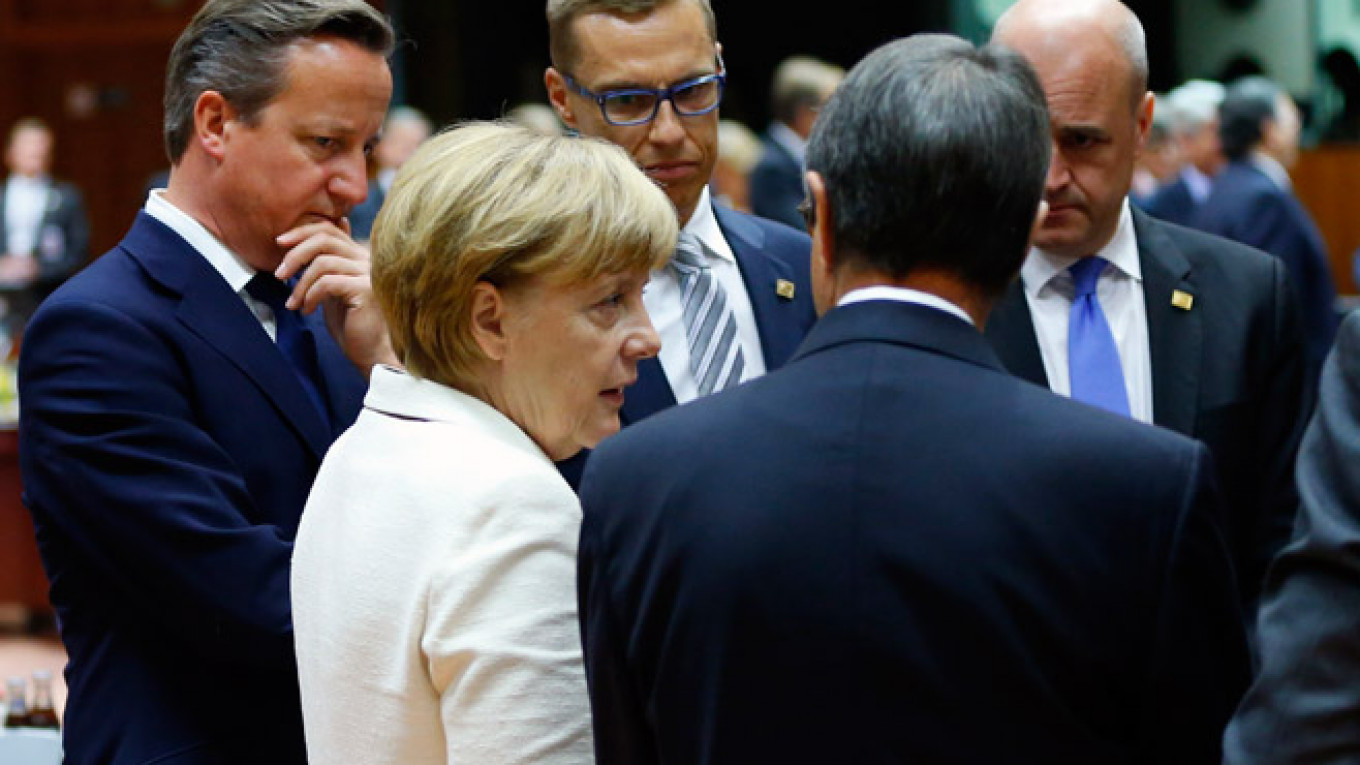The Russian currency plunged to historic lows against the dollar Thursday as the European Union appeared to end more than a week of vacillation by opting to impose a new round of sanctions against Moscow over its backing of separatist fighters in eastern Ukraine.
Significant divisions have been visible among EU member states as negotiations to reach a unanimous position on sanctions have dragged on for longer than expected.
Within hours of the EU's decision, Russia threatened to expand its retaliatory food import ban to cover European textiles and cars, hitting a European economy already on the edge of recession and deepening the rifts between EU member states.
The ruble fell to a record 37.59 against the dollar shortly after 4 p.m. in Moscow as EU diplomats told news agencies in Brussels that the sanctions were on course to be implemented Friday.
Russian stock markets also dived, with the ruble-denominated MICEX Index closing down 1.29 percent and the dollar-denominated RTS falling 1.71 percent.
The sanctions, which will build on measures enacted in July after the downing of Malaysia Airlines Flight MH17 over Ukraine, are expected to block Russian state-owned companies from European capital markets and restrict the sale of advanced energy technology. There will be a focus on Russia's oil sector, with Arctic drilling and hard-to-recover reserve development set to be hit hardest, according to media reports.
EU Divided
Divisions within the EU have been clearly visible over the sanctions issue during almost two weeks of negotiations.
Concerns have been raised by member states over the impact of Russian retaliation, as well as the possible destabilizing impact on a shaky cease-fire in Ukraine agreed last week between Kiev and separatists.
"We can only master the real problem via negotiations and a political solution and not with sanctions," Austrian Vice Chancellor Reinhold Mitterlehener was quoted by Reuters as saying Tuesday.
Countries including Austria, Finland, Italy, Slovakia and Hungary, which have closer ties to Russia, have not only questioned the efficacy of sanctions, but have been calling for a delay in their implementation.
"The only thing that is doubted, by many countries not just Finland, is whether the timing is right," Alex Stubb, Finland's prime minister, told the Financial Times on Tuesday.
The sanctions between Moscow and Brussels risks derailing a fragile economic recovery in the zero-growth EU. Lithuania, which borders Russia, this week said the measures would shave 0.4 percent off its economy this year.
While Thursday's announcement is a victory for the more hawkish stance of countries like Germany, France and Britain, concerns over sanctions appeared to have been acknowledged by European Council President Herman Van Rompuy on Thursday.
"We have always stressed the reversibility and scalability of our restrictive measures," Van Rompuy said in a statement confirming the implementation of the sanctions and promising a full review of the Ukrainian peace plan by the end of the month.
Russian Reprisals
Moscow moved swiftly on Thursday to signal its readiness to respond. "We have a whole range of non-agricultural products on which our partners, mostly Europeans, are more dependent on Russia than Russia is on them. This means, for example, car deliveries … [and] some types of clothes," said Kremlin economic aide Andrei Belousov, RIA Novosti reported.
The combative rhetoric follows an interview by Prime Minister Dmitry Medvedev published on Monday during which he said that Russia could close its airspace to Western airlines in response to sanctions. Some experts have characterized a reported fall in Russian gas deliveries to Poland in recent days as a Kremlin attempt to put pressure on the EU.
The EU's decision to go ahead with the sanctions comes after after almost a fortnight of talks during which the intensity of the fighting in eastern Ukraine has eased.
Incoming EU foreign affairs chief Federica Mogherini promised last week that a decision over sanctions would be made by Friday, but that deadline passed without a firm commitment. While the 28-member states formally adopted sanctions Monday, implementation was immediately delayed.
A truce in Ukraine between government forces and separatists appears to be holding despite reports of violence. Ukrainian President Petro Poroshenko said Wednesday that most of the Russian troops operating inside Ukraine had been withdrawn.
Western and Ukrainian leaders have repeatedly maintained that the Russian military last month staged a large-scale incursion inside Ukraine in assistance of beleaguered separatists, a charge that mobilized political support for the new wave of sanctions. The Kremlin denies the claims.
Contact the author at [email protected]
A Message from The Moscow Times:
Dear readers,
We are facing unprecedented challenges. Russia's Prosecutor General's Office has designated The Moscow Times as an "undesirable" organization, criminalizing our work and putting our staff at risk of prosecution. This follows our earlier unjust labeling as a "foreign agent."
These actions are direct attempts to silence independent journalism in Russia. The authorities claim our work "discredits the decisions of the Russian leadership." We see things differently: we strive to provide accurate, unbiased reporting on Russia.
We, the journalists of The Moscow Times, refuse to be silenced. But to continue our work, we need your help.
Your support, no matter how small, makes a world of difference. If you can, please support us monthly starting from just $2. It's quick to set up, and every contribution makes a significant impact.
By supporting The Moscow Times, you're defending open, independent journalism in the face of repression. Thank you for standing with us.
Remind me later.







